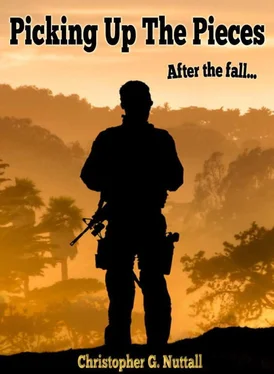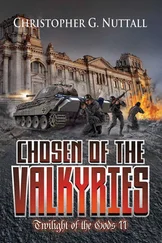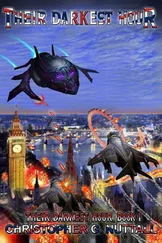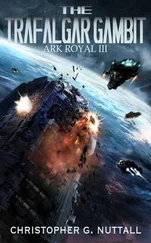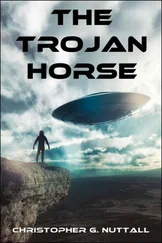An explosion, powerful enough to shake the ground even at such a distance, billowed up from the enemy lines. Jock must have hit something, I decided, or a shell had broken through and come down on a supply truck loaded with ammunition. I keyed my earpiece, hoping to hear from him, but there was no response. It was as cold and silent as the grave. I hoped — desperately — that he and his team were still alive, but there was no way to know until after the battle. The enemy were pushing closer, right into the killing ground.
“They’re advancing their tanks now,” one of the dispatchers said. “They’re not even trying to be subtle; they’re just advancing right at the defence line.”
“Keep an eye out for a trick,” I ordered. There might have been a certain amateurishness about the enemy’s armoured tactics, but anyone who scanned a UN manual on tank operations would learn that charging a position equipped with antitank guns was asking for disaster. If they were sending their tanks forward they were either idiots, which I wouldn’t hesitate to take advantage of, or they had something cunning up their sleeves and were using the tanks to distract us. “Warn the 3 rdto stand by with antitank weapons.”
I watched grimly as the tanks lumbered across the battlefield and opened fire with their machine guns at extreme range, choosing not to come any closer and run right into the antitank weapons. Their tactic did make a certain kind of sense; as long as those heavy machine guns were blazing over the 3 rd’s position, they couldn’t shoot back, but it was keeping their own infantrymen down as well. The ground was being chewed up by the bullets and everyone was ducking for cover. I thought about sending in the helicopters to hammer the tanks, but it was too dangerous as long as the enemy kept their antiaircraft weapons in position to cover their advancing forces. They’d see the helicopters coming a mile off.
“Call in mortar fire on those tanks,” I ordered grimly, as the tanks pressed forward slowly. It was enough to make me wonder if they had access to orbital reconnaissance as well… and then I understood what they were doing. There were birds flying in the air where most birds would have had the sense to flee for their lives, which suggested — shouted, rather — that most of those birds were UAV craft. I keyed my radio and ordered the machine guns to shoot them down, but as the birds started to evade our fire — dropping the pretence that they were anything other than common birds — I realised that the enemy had other tricks up their sleeves. The UAV birds flashed down towards the trench lines and exploded; a moment later, the tanks gunned their engines and raced forward, charging through the mud to press their advantage.
A tank — and a second tank — exploded as antitank rockets slammed into them and blew them into raging fireballs, but the remainder kept coming, hosing down any possible threat with their machine guns. The 3 rdhadn’t been trained for such intensity of fire and panic spread through the ranks, sending soldiers running for their lives where many of them were mown down by the tanks. I found it hard to blame them; yesterday, they’d been fighting a counter-insurgency campaign and now they were taking on some of the most fearsome weapons of modern war. The UAV birds had cleared the way.
The mortars opened fire, forcing the tanks to fall back slightly, but the enemy infantry were already advancing into the next set of lines. I saw a tank explode as a mortar round came down right on top of it, but the remainder were unharmed; they wouldn’t be harmed by anything short of a direct hit. The drivers realised what we taught our own tankers in training school and gunned their engines, pushing forward despite the increasing weight of fire. They thought that they were invincible.
“Move the 1 stforward to counter their advance,” I ordered, tightly. It was a risk, but if they tore through the lines they’d probably win the battle. We wouldn’t even be able to withdraw in good order… and even if we did, where would we go? The spaceport couldn’t be used to evacuate all of us before the enemy arrived and captured it. “Warn the tankers to be prepared for their own advance.”
I hoped it wouldn’t come to that — the Landsharks weren’t really designed to take on other tanks — but I’d bet on our tankers against theirs if there was no other choice. The enemy infantry were slowing down again — they seemed to have an unlimited supply of infantry, which didn’t strike me as being very fair, but they probably had the same impression about us — as our bombardment sharpened, but their tanks kept pushing forward gently, despite losing several more to antitank guns. Captain Jörgen Hellqvist and the remains of his unit fought a desperate battle to prevent the enemy from overrunning the trench lines, before falling back and detonating IED weapons in the enemy’s path, forcing them to slow down and check for more. The soldiers booby-trapped their dead comrades’ bodies with grenades before leaving, allowing them to strike one final blow in defence of their planet.
The meat-grinder rolled on. I threw in some of my reserves, slowing the enemy down again, even as the enemy sprung their surprise. As they’d sent their tanks forward, they’d sent infantry out to circle around our positions and try to come at us from the rear. They encountered the men of B Company in their position, waiting for the order to advance, and fell back in disarray at the precise and deadly fire that tore into their position. A UAV launched a spread of missiles at what we hoped was the enemy command vehicle, but only one missile made it through the lasers to detonate… and the enemy seemed barely slowed, if at all, by the attack. I decided that intelligence had probably gotten the details wrong…
“Incoming fire,” Peter snapped. He tackled me and knocked me to the ground just before I heard the whine of incoming shells and felt the shock as they detonated bare meters from the command post. The entire complex blacked out as the explosions cut power lines and damaged computers; emergency power, coming on a few seconds later, could only activate a handful of the computers. “Sir, this place is no longer tenable.”
“Probably,” I said, pulling myself to my feet. Peter’s weight was considerable. Did the enemy know what they’d done? We’d trained our people to use their initiative where necessary, but with the command links severed it would be harder to control the overall battle. “We need to fall back to the secondary command post.”
Outside, the noise of fighting was loud enough to damage my eardrums, even with the earpiece communicator that also served as an ear protector. I covered my ears as Peter ran ahead, scouting for new threats as we followed, keeping low to avoid flying shrapnel. There were dead bodies even in the rear, men and women killed by debris from incoming shells and mortar rounds, and we ducked around them as we fled towards the secondary command post. It dawned on me, in a moment of pure amusement, that we probably looked ridiculous, but who cared? We had to stay alive. I was still smiling as we burst into the secondary command post and met the relieved gaze of the dispatchers, who’d suddenly found themselves coordinating a battle.
“Sir, you’re alive,” the leader said. “We feared we’d lost you when the command links went down.”
“Rumours of my death, etcetera, etcetera,” I said, as I took the command chair and summoned up the live feed from the destroyer. The enemy seemed to have stalled on the fourth defence line, but were bringing up their heavy guns to try and pound the defenders into paste before they advanced again. I couldn’t fault the tactics, but it was evident now that it had just been a lucky shot that had knocked out my command post. If they had known what they’d done, they would have used our brief confusion to push their advantage as far as they could. “Do we have full command links?”
Читать дальше
